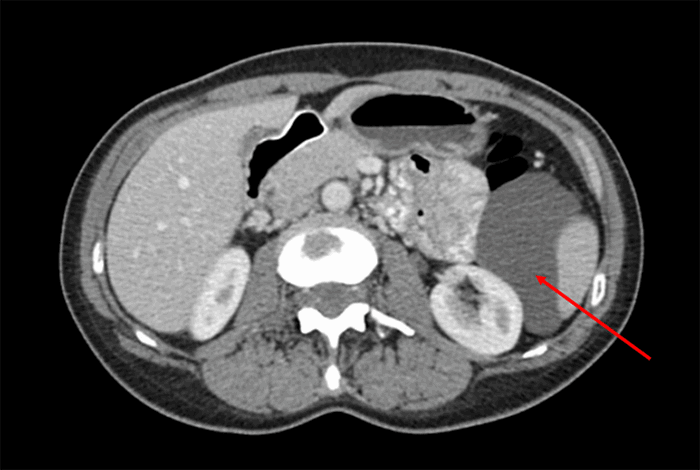
If you or a loved one are suffering from peritoneal mesothelioma, this article will help you learn more about this aggressive, rare cancer, along with how it can be treated.
As always, you should consult your doctor about what treatments are right for you. This article is intended as information only and should not be considered medical advice.
What Is Peritoneal Mesothelioma?
According to the Mesothelioma Guide, peritoneal mesothelioma is a cancer that forms in the thin lining of the abdomen, which is called the peritoneum. The cause for this is ingesting asbestos fibers.
Asbestos fibers are dangerous because although they appear to be a fine powder, they are sharp and lodge themselves into human tissue. When these sharp fibers remain in tissue for long periods, they cause irritation and inflammation, which can eventually turn into cancer.
Peritoneal Mesothelioma Symptoms

The existence of mesothelioma can be hidden for many years, but when people start to notice something is wrong, they usually present with the following symptoms:
- Vomiting
- Nausea
- Bowel problems
- Constipation
- Fever or sweating
- Abdominal pain
- Tissue lumps
Mesothelioma Facts at A Glance
- Peritoneal mesothelioma is the second most common form of this disease and accounts for 10-15% of all mesothelioma cases.
- The only known cause of mesothelioma is asbestos exposure.
- It’s mostly males who are diagnosed with peritoneal mesothelioma (56%), but it affects females more than pleural mesothelioma.
- The survival rate for patients with peritoneal mesothelioma is longer than those with pleural mesothelioma.
- The average age of diagnosis is 57 years.
What Causes Asbestos Exposure?

There are so many ways people can be exposed to asbestos, including through products designed for insulation, fireproof coatings, vinyl floor tiles, vehicle braking systems, and other building materials.
Most asbestos-based materials are now banned from being made or imported into the United States, and new products can’t be made. However, asbestos has not yet been outright banned, so there are still many possible sources of exposure, with the most common source being the disruption of asbestos fibers in pre-existing buildings.
For example, when buildings are demolished, walls are knocked down, or vinyl floor tiles are ripped up, asbestos fibers get into the air and anyone in the room without a proper respirator will end up breathing in those fibers.
How Do Doctors Treat Peritoneal Mesothelioma?
The primary treatment is cytoreduction surgery, which debulks and removes all visible tumors and diseased tissue. During this process, the peritoneum is also removed.
Another common form of treatment is chemotherapy, including heated intraperitoneal chemotherapy (HIPEC). This is a form of localized chemotherapy that bypasses the bloodstream and is injected directly into the abdomen to kill cancer cells after cytoreduction has been performed. This targeted approach makes it more effective and less damaging to the rest of the body.
A HIPEC study performed by Dr. Paul H. Sugarbaker resulted in 60% of patients having a 3-year survival rate and 47% of patients having a 5-year survival rate.
A Personal Injury Lawsuit Can Help You Recover Damages

If you’ve been diagnosed with peritoneal mesothelioma, it’s worth filing a lawsuit to recover financial compensation for your illness. You have every right to hold someone accountable for causing your illness. You shouldn’t have to pay your medical bills or struggle to pay your household bills and take care of your dependents on your own.
It’s strongly advised to contact a mesothelioma attorney right away to see if you have a case. If you have a proper diagnosis and can prove you were exposed to asbestos, there’s a good chance a lawyer will take your case and the jury could award you a generous amount of money.
Juries typically hand down awards higher than settlements because you can only get punitive damages through a lawsuit. Most juries don’t go easy on parties they find responsible for mesothelioma cases. Many asbestos-related lawsuits end up with multi-million-dollar judgments just for one plaintiff.
When big corporations are being sued in a multi-district or class action lawsuit, even the settlements are massive. For example, Johnson & Johnson offered plaintiffs an $8.9 billion settlement to 60,000 plaintiffs.
Prevention and Risk Reduction
Reducing the risk of asbestos exposure is vital, especially for those working in environments where it’s present. Asbestos, a known carcinogen, can lead to serious health conditions like peritoneal mesothelioma.
Preventive measures include following occupational safety guidelines, using protective gear like masks and overalls, and undergoing regular health check-ups. Employers should provide asbestos awareness training and ensure compliance with safety protocols.
It’s essential to recognize asbestos-containing materials and understand how to handle them safely. Adequate ventilation and never using tools that produce dust, such as power tools, on asbestos materials are also key precautions.
Support and Resources

For individuals diagnosed with peritoneal mesothelioma and their families, finding support and resources is crucial. Support groups offer a space to share experiences and coping strategies.
Organizations like the Mesothelioma Applied Research Foundation (www.curemeso.org) and the Asbestos Disease Awareness Organization (www.asbestosdiseaseawareness.org) provide valuable information, guidance, and emotional support.
These resources can help patients and families navigate the challenges of the diagnosis, offering both community support and expert advice.
Legal Process Details
Understanding the legal process is important for those considering a personal injury lawsuit related to mesothelioma.
This process generally involves several steps: hiring an experienced mesothelioma attorney, gathering evidence of asbestos exposure and its health impact, filing a lawsuit, and possibly going to trial or reaching a settlement. The timeline can vary, but it’s often expedited due to the aggressive nature of mesothelioma.
An experienced attorney can guide patients and families through this process, helping to secure compensation for medical expenses, lost wages, and pain and suffering. Consulting with a specialized attorney early is crucial, as there are often statutes of limitations on these cases.
If You Suspect You Have Peritoneal Mesothelioma, See a Specialist Promptly

If you’re experiencing any of the symptoms of peritoneal mesothelioma, you must see a doctor right away.
Don’t wait to seek a proper diagnosis because the sooner you do, the faster you can start treatment and file your lawsuit.






